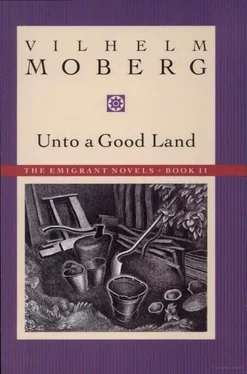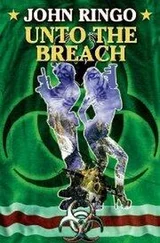Kristina was uneasy each time she boarded a new means of transportation — she was afraid her family might be separated during the journey; she wanted them to hold on to each other all the time.
The American steamer was new and the middle deck roomier, lighter, and drier than the immigrants’ living quarters on the old Swedish ship; nor did this vessel smell musty. But when all had gone aboard and packed themselves in down there, it was just as crowded and uncomfortable as it had been on the Charlotta. The passengers’ belongings were stacked together helter-skelter on the lower deck, and the owners had to look after them and watch that nothing fell overboard. On the Charlotta they had been allowed the unrestricted use of the upper deck in fine weather, but here they were confined to the lower deck. Yet they could see there was plenty of space on the upper deck, where only a few passengers walked about. The immigrants enviously watched these fellow travelers who had their individual cabins and more room than they needed: why was that deck up there in the fresh air and daylight reserved for only a few, while such a great number of people must stay below, packed together?
Long Landberg explained that the upper deck was first class, which cost much more than a berth in steerage, and the ladies and gentlemen up there were wealthy travelers on a pleasure excursion.
Kristina noticed that the passengers on the upper deck were dressed like the people she had seen walking about near the harbor in New York: the women in silk skirts and velvet shoes, the men in tall hats and long coats of costly cloth. And here, too, the women went about with open umbrellas even though it wasn’t raining. Those passengers up there were not, like themselves, traveling to find homes; they already had homes. Why did they travel when not forced to? How could anyone, of his own free will, roam about on lakes and seas? If Kristina ever found another home in this life, she would certainly stay there.
And these passengers who traveled just for fun were allowed to keep the whole upper deck to themselves, while the immigrants, forced to find new homes, were crowded and jostled down here. Kristina thought that the passengers in first class were like the gentry at home in Sweden, and she asked her brother-in-law Robert, who had learned so much from all kinds of books, to explain this: Hadn’t he said that the inhabitants of North America were all alike and not divided into gentry and ordinary people?
Robert tried to make himself clear: He had only said that different classes did not exist in the New World, no one was born into a class. But there was, of course, a difference between people, in that some were rich and others poor; some could afford to spend more, others less; some could afford first class, others could not. There were only two kinds of people in North America: those who had lived here long enough to grow rich, and those lately arrived and still poor.
There was no other difference between people, Robert insisted. Kristina could observe for herself — did she see anyone who took off his hat or cap to another? Did she see any man bow or any woman curtsy? Here one didn’t stand on ceremony, the poor didn’t kowtow to the rich as they did at home in Sweden.
The ship’s fare was ample, even abundant, but to the Swedish peasants it seemed oddly prepared and peculiarly flavored. American food consisted mainly of things mixed together, and one’s tongue was unable to distinguish one kind of food from another; the immigrants did not always know what they were eating. But still more foreign than the food were their fellow passengers in the hold. They were lodged with other immigrants, people who, like themselves, came from countries of the Old World, each speaking his own language. Their fellow passengers were dressed in outlandish clothes, they laughed and sang and behaved in the strangest ways, and they were loaded down with an amazing variety of things: axes, hoes, spades, harnesses, saws, tubs, barrels, cradles, clocks, pots, yarn winders, ale kegs. The Swedish immigrants began to feel that they had arrived empty handed in North America when they saw what these others carried along. Many of those who crowded the ship with their belongings were Germans, the guide told them; a German was wedded to his possessions and would not part with them when emigrating. But when they saw a spade with a six-foot handle, said Landberg, they might be sure the owner was Irish: the Irish were too lazy to bend their backs while digging; at work they stood upright.
He pointed out some tall men in skin jackets who carried guns and hunting sacks and had knives in their belts. They were fur hunters on their way to the forests of the West for autumn game.
But strangest of all the steerage passengers were two Indians. The immigrants studied them with timid wonder. The two men were draped in pieces of red-striped woolen cloth which covered them from head to knees and which they usually held closely around themselves; they wore trousers reaching the middle of their thighs and held in place by strings to a belt around their waists; on their feet they wore skin shoes but no socks. From the Indians’ ears hung beautiful glittering silk bands; the color of their faces was sooty brown, and their sloe-black eyes lay deep in their skulls, lurkingly under their brows.
Most of the time the Indians sat immobile, staring moodily before them, each holding his blanket tight around his body as if this garment were his only possession. No one addressed the brown-hued men, and they themselves seemed inclined to silence. When they spoke to each other they used a language which sounded like a series of short grunts. These Indians could not be wild, as they were allowed to travel unhindered among white, Christian people. But they sat apart from the other passengers, who walked by them in silence and with some uneasiness; perhaps they were heathens after all; one couldn’t know for sure; there was something dark, threatening, and cruel in their looks, something inspiring fear. The immigrants did not know what to think of or expect from these curiously draped figures.
The steamer had a large crew — bosuns, engineers, stokers, and deckhands. Negroes served in many capacities; those black men with hair like wood shavings prepared the food and served it, loaded the ship, cleaned it, and busied themselves everywhere. The black crewmen were free, but among the passengers in steerage were two Negro slaves shackled in foot chains, because they were said to have wild tempers.
Kristina felt pity for the two black-skinned men sitting there chained together, unable to move. Why were people put in chains and foot irons when they had done no wrong? The slaves’ owner was among the pleasure travelers on the upper deck: Kristina would have liked to ask him to unshackle the poor Negroes, had she been able to speak his language.
Little Johan watched the Negroes for a long time in silence. Then he asked his mother: How long had their faces been so terribly black?
“They have always been that way.”
“Are they black both morning and evening?”
“Yes. Negroes are always black.”
“But, Mother — how can they know when they need to wash themselves?”
“I don’t know. . Quiet, now.”
But the boy insisted: “Tell me, Mother, how do the Negroes know when they are dirty?”
Kristina was unable to give Johan this information. She herself was deeply disturbed by the dirty white passengers in steerage. No Negro could help it that the Lord God had made him black, but when God had given people white skin, then they owed it to their Creator to keep it white. Children and menfolk seemed to crave a little dirt for comfort’s sake, but Kristina demanded more from women. Here she saw womenfolk who were sorely in need of a thorough scrubbing in boiled lye-soap, and their children appeared never to have touched water since they were baptized. Fina-Kajsa, to be sure, wasn’t very clean, and washed herself unwillingly, but compared to these foreign women she stood out as clean as an angel. They were probably too lazy to keep dirt from them; slothfulness bred uncleanliness and uncleanliness bred vermin; among these people they must be careful or they might again become lice infested.
Читать дальше










